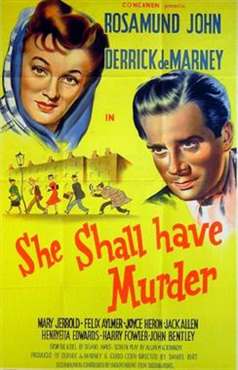Top Qs
Timeline
Chat
Perspective
She Shall Have Murder
1950 British film From Wikipedia, the free encyclopedia
Remove ads
She Shall Have Murder is a 1950 British drama film directed by Daniel Birt and starring Rosamund John, Derrick De Marney and Felix Aylmer.[1][2] It was written by Allan MacKinnon based on the 1949 novel of the same title by Delano Ames. The screenplay concerns a law office clerk who becomes a detective. It was co-financed by the Woolf brothers.[3]
Remove ads
Premise
A law office clerk who aspires to be a crime writer, turns into a detective when someone at her work is murdered.[2]
Cast
- Rosamund John as Jane Hamish
- Derrick De Marney as Dagobert Brown
- Mary Jerrold as Mrs. Robjohn
- Felix Aylmer as Mr. Playfair
- Joyce Heron as Rosemary Proctor
- Jack Allen as Major Stewart
- Henryetta Edwards as Sarah Swinburne
- Harry Fowler as Albert Oates
- John Bentley as Douglas Robjohn
- Beatrice Varley as Mrs. Hawthorne
- June Elvin as Barbara Jennings
- Jack McNaughton as bBarman
- Olaf Pooley as Mr. White
- Dennis Val Norton as pub landlord
- Francis de Wolff as Police Inspector
- Jonathan Field as darts player
- Jimmy Rhodes as racing man
- Tony Hilton as steward
- Frances Leak as shooting gallery attendant
- Wanda Rands as change girl
- Duncan Lamont as Police Sergeant
Remove ads
Reception
The Monthly Film Bulletin wrote: "The tone of the film is one of determined and occasionally forced gaiety, which the action is too slow to sustain; the mystery, however, holds a certain amount of interest to the end, although none of the characters are sufficiently developed (particularly the murderer) for their motives to assume much plausibility."[4]
Picture Show wrote: "Acting honours go to Harry Fowler for his smooth, humorously horrifying characterisation as an office boy with a flourishing 'spiv' sideline. Rosamund John and Derrick de Marney give most attractive portrayals and are excellently supported."[5]
Picturegoer wrote: "Another British film which doesn't come off – despite some very gallant acting by its stars. The cause of the trouble is a jumbled script – it is shockingly naive at times – which contains too many miraculous coincidences."[6]
In British Sound Films: The Studio Years 1928–1959 David Quinlan rated the film as "mediocre", writing: "Slow unconvincingly acted film has most of the faults typical of second-rate British thrillers of the time"[7]
References
External links
Wikiwand - on
Seamless Wikipedia browsing. On steroids.
Remove ads

